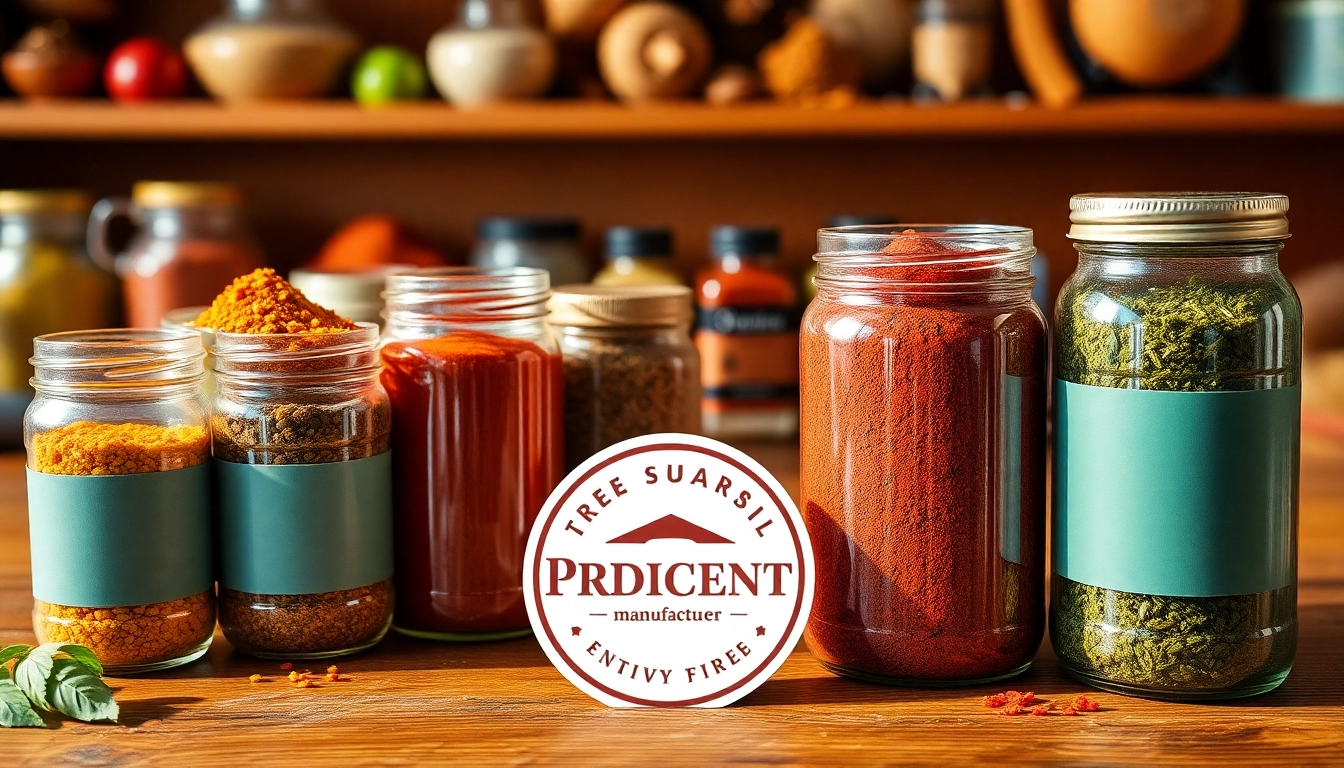Understanding the Role of a Top Food Manufacturer in Spices and Processed Foods
In today’s global food industry, the reputation of a Manufacturer plays a crucial role in determining product quality, safety, and consumer trust. A leading food manufacturer not only produces authentic and high-quality products but also adheres to strict certification standards and participates in major industry exhibitions worldwide. These elements collectively establish credibility, expand market reach, and foster long-term partnerships. For companies like Spice Nest, being recognized as a top manufacturer involves a combination of rigorous quality assurance, innovation, and strategic market positioning.
The significance of a reputable manufacturer extends beyond just production; it encompasses comprehensive supply chain management, adherence to international standards, and continuous product innovation. This article delves into the core qualities that define a leading food manufacturer and how their commitment to quality and innovation sustains their competitive edge in the global market.
What Defines a Reputable Food Manufacturer?
A reputable food manufacturer distinguishes itself through a confluence of factors including consistent quality, regulatory compliance, strong ethical practices, and a customer-centric approach. These elements ensure that products are safe, authentic, and meet international standards. For instance, Spice Nest’s presence at major food exhibitions worldwide not only validates its credibility but also provides a platform to showcase its product range to global buyers and industry experts.
Additionally, a reputable manufacturer invests heavily in quality control systems such as HACCP, ISO certifications, and organic certifications where applicable. These standards guarantee that each batch of spices, processed foods, or herbs maintains high purity, freshness, and flavor integrity. Transparency in sourcing, meticulous processing techniques, and adherence to food safety protocols further cement their standing in a competitive marketplace.
Moreover, a top-tier manufacturer actively participates in industry trade shows, like Biofach or Anuga, which are crucial for networking, understanding consumer trends, and benchmarking against international competitors. Such engagements reflect a manufacturer’s dedication to transparency, quality, and global standards.
Key Qualities of a Leading Spice Manufacturing Company
Leading spice manufacturers exemplify several key qualities that set them apart:
- Authenticity and Purity: They source premium raw materials directly from trusted farmers or suppliers, ensuring the authenticity of spices and herbs.
- Hygiene and Safety: Advanced processing facilities with stringent cleanliness standards reduce contamination risks.
- Innovation: Incorporation of modern processing techniques, new product development, and flavor innovations cater to evolving consumer preferences.
- Certifications and Compliance: Certifications such as organic, HACCP, FDA, and FSSAI authorize their products for international markets.
- Customer-centricity: Feedback loops and customized packaging solutions highlight their focus on client needs.
- Global Presence: Participation in international trade fairs demonstrates their commitment to expanding global footprint and establishing trust with worldwide clients.
For example, Spice Nest’s consistent presence at international exhibitions like Biofach and Gulfood signifies their commitment to quality and global outreach. Their wide product range, including spices powder, whole spices, and dehydrated foods, showcases their capacity for innovation and specialization.
How Certification and Exhibitions Elevate Manufacturer Credibility
Certifications serve as formal validations of a manufacturer’s commitment to quality, safety, and environmental standards. Certifications such as ISO 22000, HACCP, and organic labels demonstrate adherence to international food safety protocols. For a spice and processed food manufacturer, these credentials foster trust among global buyers and consumers.
Equally important are participation in exhibitions and food trade shows. Events like Biofach, Anuga, and Gulfood attract industry leaders, suppliers, and buyers from around the world. Presenting products at such platforms allows manufacturers to showcase their innovations, establish business relationships, and stay updated with industry trends.
Spice Nest’s successful showcase at Biofach 2024 exemplifies how strategic exhibition participation can amplify brand visibility and credibility. Such exposure not only validates product quality but also enhances the company’s reputation as a leading exporter.
These efforts collectively position a manufacturer as a trustworthy and forward-thinking player in the global food industry.
Product Range and Specializations of Food Manufacturers
Spices and Powder Products: Quality and Authenticity
The foundation of many culinary traditions, spices and powders require meticulous sourcing and processing. Top manufacturers, like Spice Nest, emphasize authentic blends and superior grinding techniques to preserve flavor, aroma, and color. Their extensive range includes turmeric, cumin, coriander, and curated spice blends tailored for regional cuisines.
Processed Foods: Ready-to-Eat and Gourmet Selections
Modern consumers demand convenience without compromising on taste or quality. This has led manufacturers to develop ready-to-eat products such as gravies, pickles, jams, and chutneys. For example, Spice Nest offers a variety of ready-to-eat gravies like Palak and Veg Kolhapuri, which combine traditional flavors with modern packaging and shelf stability.
Herbs, Oils, and Superfoods: Trends and Consumer Demand
The increasing focus on health and wellness has propelled demand for herbs like basil, oregano, and thyme, as well as nutrient-dense superfoods and oil seeds. Manufacturers are innovating by offering dehydrated herbs, cold-pressed oils, and superfood blends that cater to health-conscious consumers globally.
An example is Spice Nest’s range of dehydrated herbs and superfoods, which retain maximum nutritional value and flavor, meeting the rising consumer preference for organic and functional foods.
Manufacturing Processes and Quality Assurance
Processing Techniques Ensuring Freshness and Safety
Advanced processing methods such as sterilization, controlled drying, vacuum packaging, and precision grinding are crucial to maintaining product freshness and extending shelf life. Manufacturers like Spice Nest employ state-of-the-art equipment to ensure minimal contamination and maximum preservation of flavor.
Certification Standards for Food Manufacturers
Certifications like ISO 22000, HACCP, organic, and FSSAI play a pivotal role in standardizing quality norms. These standards facilitate entry into international markets, assure consumers of product safety, and demonstrate comprehensive quality management systems.
Innovation and Customization in Food Production
Leading manufacturers continuously invest in R&D to develop unique spice blends, flavor enhancers, and health-focused products. Customization options include private labeling, unique packaging, and formulation tailored to customer specifications, enabling brands to stand out.
Market Presence and Export Capabilities
Global Export Strategies of Food Manufacturers
Export success hinges on maintaining quality, competitive pricing, and effective logistics. Top manufacturers leverage international certifications and participate in global trade shows to access diverse markets. Establishing reliable distribution channels and building international partnerships are key strategies.
Participation in Major Food Exhibitions Worldwide
Events such as Biofach (Germany), Gulfood (UAE), and Anuga (Germany) provide platforms for exporters to showcase their latest offerings, network with buyers, and stay aligned with global consumer preferences. Spice Nest’s active participation in these forums exemplifies their strategic approach to market expansion.
Building Trust and Long-term Partnerships
Consistent product quality, transparent communication, and reliable delivery underpin strong international relationships. Manufacturers that prioritize customer feedback and adapt quickly to market trends foster loyalty and secure long-term collaborations.
Future Trends and Challenges for Food Manufacturers
Adapting to Organic and Organic Food Trends
The organic food movement continues to grow worldwide. Manufacturers are increasingly adopting organic farming practices, obtaining organic certifications, and developing organic product lines. Such shifts not only meet consumer demand but also position brands as responsible and sustainable.
Technological Advancements in Food Manufacturing
Innovations such as automation, AI-driven quality control, blockchain for traceability, and clean label formulations are transforming the industry. These advancements improve efficiency, transparency, and consumer confidence.
Supply Chain Sustainability and Compliance
Sustainable sourcing, eco-friendly packaging, and waste reduction are imperative for future-proofing operations. Regulatory compliance and ethical practices help mitigate risks and maintain competitive advantage in a rapidly evolving market landscape.

